Energy, energy security, energy independence and energy sovereignty are fundamental features of international relations and geopolitics.
Indeed, Thomas Homer-Dixon, in his fascinating The Upside of Down: Catastrophe, Creativity and the Renewal of civilization (Knopf, 2006) reflected upon the fall of Rome and its civilization and other disasters to identify how and why a society could break down and how to avoid such a fate. In a nutshell, he shows that five tectonic stresses (population, energy, environment, climate and economy) accumulate, which then combine with two multipliers (the rising speed and global connectivity, and the escalating destructive power of small groups) “to make breakdown more likely, widespread, and severe.” Among these five tectonic stresses, he underlines that energy is particularly important because it is a master resource. Indeed, energy is embedded in every parcel of our contemporary lives, from every step of the food chain, to transportation, industry, trade and availability of goods, defense, etc.
Considering the crucial importance of energy for our civilization and the impact of its use on the environment, it is necessary to understand the issue at hand, and to keep abreast of developments in this area to be able to anticipate potential evolutions and how they will affect us and more generally all actors.
In-depth analytical articles related to energy security
- Uranium for the U.S. Nuclear Renaissance – 2: Towards a global geopolitical race
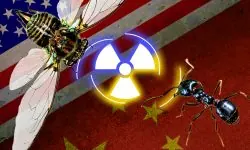
- Uranium for the U.S. Nuclear Renaissance – 1: Meeting Unprecedented Requirements

- Towards a U.S. Nuclear Renaissance?

- Niger: a New Severe Threat for the Future of France’s Nuclear Energy?
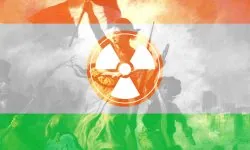
- Revisiting Uranium Supply Security (1)
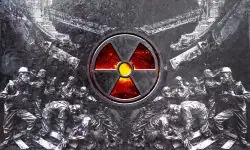
- The Future of Uranium Demand – China’s Surge
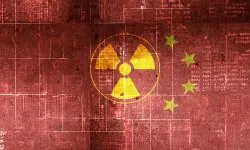
- Uranium and the Renewal of Nuclear Energy
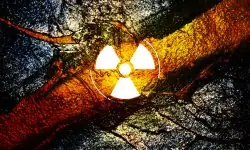
- The Return of Nuclear Energy
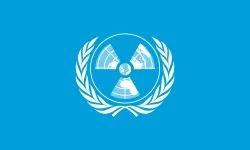
- Early Warning for Individuals and Small Businesses – Overcoming Energy Insecurity

- COVID-19 and Food Insecurity Early Warning

All Energy Security related articles
Feature image: azrainman, CC BY 2.0 https://creativecommons.org/licenses/by/2.0, via Wikimedia Commons

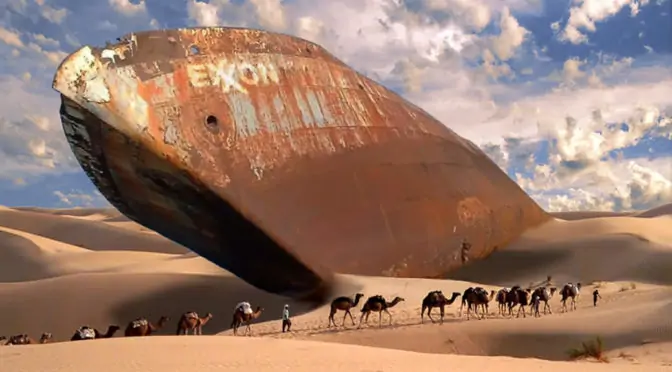

I did not go through the entire book.I am sure its going to be very interesting and exciting.However,I wish to know one thing:has the flow of shale oil and shale gas delayed the economic decay of the United States.Perhaps one can put it differently,if the supply of shale oil and gas substantially boosted the US power worldwide.
Thanks and regards,
fereydoun
Hello Fereydoun,
Very interesting question, to which I do not have the answer right now, as I did not do the research… but Jean-Michel is preparing a post on energy and he might be answering this very question there… serendipity. I am sure he will drop a comment here later tonight. (And Homer Dixon book is really good :)!)
Dear Dr.Lavoix,
Happy New Year to you.Please accept my apologies for being late in expressing my greetings.
Good morning from Tehran with one of the slowest internet speed in the world and still most commonly used means of communication in this country.
This note is in reference to your timely and thoughtful article and analysis on Saudi Arabia’s oil diplomacy and its impact on the global market.
When oil prices started to decline in early 2014,every analyst looked at the falling prices totally politically and conspiracy motivated.Most believed that it was a U.S.-Saudi conspiracy aimed at exerting pressure on Russia and Iran for obvious reasons.However,as time passed and by mid-2015,market watchers swiftly changed to market-oriented analysis.On the supply side there are too much crude oil all over and on the demand side,Chinese economy which acted as the engine of oil price growth for about a decade has slowed down.I mean that we changed from political intrigue as the main culprit to total market-basef approach.This is where I have problem.I can not contemplate if we were wrong back in early 2014 or we are wrong now.As you rightly mentined in your article for Saudi Arabia oil price is always a political project.
Dear Dr.Lavoix,could we please have your thought on this issue if you find time or any relevance in this.
Thank you and my best regards,
fereydoun
Dear Fereydoun,
First of all, please no need to apologise and thank you for your wishes for the New Year, which the whole team and I reciprocate. Your question is definitely worthwhile, all the more so that I do not believe in single sided explanations or “mono-causality”. Thus, I would tend to believe that actually all elements from international relations, to financial and monetary impact as you pointed out in an earlier comment to domestic issues – notably right now in the case of Saudi Arabia – to market-based factors interact to constrain and influence actors’ decisions and as a result the situation. In the case of market-based (and futures) prices, the beliefs and perceptions of the traders should most probably also be considered, not so much because they are correct or false, but because they influence (determine) price. This is the short answer to your question, the long one would include fully developing the “model” related to oil market, including – and this we are trying to do, unfortunately more slowly than we would ideally like – considering the relationships between Saudi Arabia and Iran.
Again I wish you and your family a greatNew Year 2016,
Helene
Dear Dr.Lavoix,
I am always delighted your thoughts and discourses on topics of vital importance,one of which is energy security.
Of late debates regarding future energy path and direction of Iran’s energy strategy is discussed in international forums and in Iran.The discussion on revival of silk road and Chinese-Indian-Iranian-Russian link connection is raised by different scholars and policy-makers.The silk road vision makes sense in a big way.Future energy trend is from west to east and north to south.
However,taking the topic more realistically,Iran’energy movement and country’s economy has been towards west.In fact Iran’s economy is complementary with the western countries.West has got all that Iran needs to develop right on the table and in return Iran is rich in raw materials and mineral resources that western economies require.This make Iran and westers economies complementary.While Iran’s economy is competetive with most of Asian and Russian economies.
For instance looking at ECO where 12 countries of Central Asia joined in with Iran,Turkey and Pakistan.They all are importers of technology,industrial goods and capital from west and exporters of raw materials and primary products to the west.The intera-trade volume of ECO members is less than 0.5 per cent of their total trade.
I wish to know the terms and conditions which might help Iran go east.
However,China is an exception brcause their economy is complementary with that of Iran and several other Asian countries.
Thank you and my best regards,
fereydoun
Dear Fereydoun,
First of all, please accept my apologies for answering with so much delay, but with the launch of the online course we were quite busy!
Your question is very interesting as always. It seems to me you underline a “dilemma” that could be framing somehow much of the current choices of the country in the region: because of geography (the door or a cross-road between Asia and Europe), but also because of historical dynamics (the rise of China and Asia and a relative “decline” of Europe). Maybe the answer or rather an answer could depend first on evaluations regarding the nature, extent, intensity etc. of the rise of Asia and of the potential or real decline of Europe….as well as on the existing “roads” to Europe versus the still to be built ones to Asia.
I would tend – but of course a detailed estimate/study would be necessary – to think that we are not faced with an either/or situation: Iran could very well aim at developing both East and West linkages. This may anyway be necessary considering timing (the existing infrastructure to the West while those to the East are still to be built) and this could also fit quite well strategically with the Chinese vision of One Belt- One Road. Should Iran succeed in such a certainly difficult enterprise, it would most probably give it a strong competitive advantage over other countries, which would only grow with years (furthermore, one may also envision developing further a network of relationships with these other countries to create a strong fabric of which Iran would be a crucial node).
Just thoughts on a definitively crucial and so interesting issue, which would absolutely warrant an in-depth study.
What do you think?
With my best regards
Helene